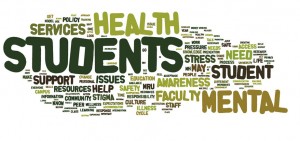Healthy minds make better students
MRU works to create awareness and reduce stigma
Holly Triebwasser
News Editor
The importance of student mental health has become an increasingly common discourse on university campuses across North America, and Mount Royal University is among the institutions actively involved in creating awareness about the mental health issues students face.
National Depression Screening Day, an online event that took place on Oct. 4, is one of the many ways MRU is working to create awareness for students and employees on issues of depression.
“Why are post-secondaries concerned?” said Kandi McElary, director of Mount Royal Wellness Services. “More students are coming in with mental health issues, and they’re more complex.”

During a mental health workshop, participants use Wordle to determine which topics hold the most importance. Photo courtesy of Wellness Service
Tackling issues of metal health on campus is working through community awareness and reducing stigmas, with help of the newly established Presidential Taskforce for Student Mental Health with MRU president David Docherty.
“To me it’s an important issue,” Docherty said. “People will start to take it seriously. They shouldn’t be embarrassed to come forward about mental health issues.”
McElary said the majority of the time, mental health issues arise in people between the ages of 18 to 24, which impacts both education and student retention.
One of the starting points is by providing sufficient training for those in direct contact with students, including deans’ council, academic advisors, security officers, resident advisors, physicians and professors.
In June, 150 people at MRU were trained under Mental Health First Aid and more are expected to complete the program.
MRU also participates in the National College Health Assessment survey, in which each participating institution randomly chooses 5,000 students to answer a survey based on questions about their behaviors, habits and perceptions.
Individual institutions can then compare their results against other institutions and use the findings to better understand where they need improvement.
“Then we can compare nationally and take the stats to the government,” McElary said.
Questions in the survey will ask things such as, “Which of the following have been traumatic or very difficult to handle? Academics, finance, intimate relationships, family problems, sleep difficulties, career-related issues or personal appearance?”
This example from the 2010 NCHA survey found that 52.2 per cent of people said stress, compared to only 43.9 per cent in the reference group, which is made up of all participating institutions in North America.
The perception-based questions, which focus on creating awareness amongst students about their peers’ behaviors, ask students questions about the general population, such as the percentage of MRU students who they believe smoke cigarettes, drink alcohol or smoke marijuana on a daily basis.
Respondents believe that 27.7 per cent of students smoke cigarettes daily, when the reality is only nine per cent actually do.
“We’re one of the few institutions doing it,” said McElary, noting that during the last survey only six Canadian institutions participated.
The goal to include more Canadian post-secondary institutions in the survey will increase accuracy, as well as generate more Canadian-based results.
“For us it’s identifying the problem and the ways we can best reach out to students,” Docherty said. “How can we make sure we’re assisting students while maintaining their privacy and dignity?”
If you have experienced symptoms of depression, visit Mount Royal Wellness Services for more information.


